
The Climate Change and Disaster Risk Reduction Working Group aims to enhance the role of young scientists in advancing understanding and informing decisions in a changing climate.
You can watch the group’s videos on the GYA Climate Change channel on YouTube here.
Projects and plans for 2024/25
In April 2025, the group co-lead Ovie Edegbene, attended the International Urban Health Summit in Hannover, Germany, and presented a poster titled “Climate Change and Urban Health“.
In April 2025, group co-leads submitted a case study for the Internation Science Council’s (ISCs) Call for case studies of science in action for sustainable development.
In February 2025, the group, together with the Institute of Global Health and Health Security (IGH & HS), Federal University of Health Sciences Otukpo (FUHSO), Nigeria, organised a workshop on “Flood prevention, mitigation and management” online and on location in Nigeria. The workshop was organised by group co-lead Ovie Edegbene and featured GYA members as speakers. It looked at the development of strategies to prevent, mitigate, and manage global challenges such as increased flooding events. You can read a report here.
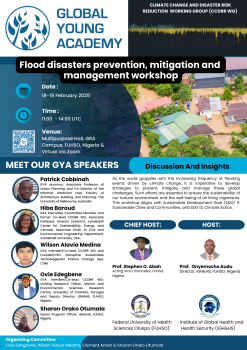
In December 2024, group co-leads Wilson Alavia Medina and Ovie Edegbene organised a webinar on “The Interconnectedness of Energy Industries, Communities, and the SDGs”. GYA member Stella Tsani, as well as GYA Alumni Renard Siew and Patrick Cobbinah spoke on the global energy landscape’s transformation and the impact of this shift towards renewable and green energy sources on local communities around the world. The session explored how both traditional and green energy sectors can engage with communities for mutual benefit, balance the competing demands of energy development and resource use, manage conflicts and contribute to the UN SDGs. This webinar was the first of a series of webinars around “The Interplay of Industries, Sustainable Communities, and SDGs in the Face of Climate Change” that the group is planning to organise in 2024/2025.
In November 2024, group co-leads Wilson Alavia Medina and Ovie Edegbene, together with group members and with members from several other GYA working groups, jointly published a statement on “Young researchers and scholars’ proposals for action for a sustainable present and future”. GYA Alumnus Renard Siew presented the statement during the “Climate Science: key take aways in 2024” event co-organized by the International Science Council (ISC) and the Karlsruhe Institute of Technology (KIT) on 12 November 2024.
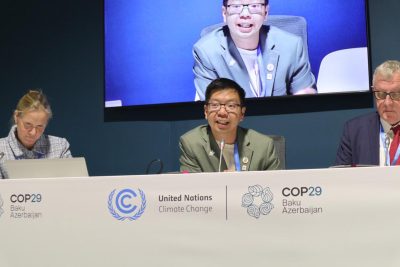
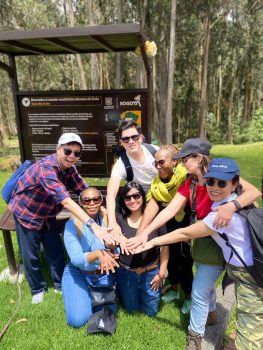 In October 2024, group member Peter Gan Kim Soon participated in the “Act on Climate: A Convening on Planetary Health and Just Transition”, held in Bogotá, Colombia, and organized by the Atlantic Institute and Dejusticia, a Colombia-based research and advocacy organization dedicated to the strengthening of the rule of law and the promotion of social justice and human rights in Colombia and the Global South. This event brought together a diverse group of researchers, activists, and policymakers dedicated to exploring the intricate relationship between climate change and equity. The discussions were framed around the urgent need for a just transition, and frameworks and approaches were developed that will provide a robust foundation for action and collaboration on effective climate action. Read Peter’s report here.
In October 2024, group member Peter Gan Kim Soon participated in the “Act on Climate: A Convening on Planetary Health and Just Transition”, held in Bogotá, Colombia, and organized by the Atlantic Institute and Dejusticia, a Colombia-based research and advocacy organization dedicated to the strengthening of the rule of law and the promotion of social justice and human rights in Colombia and the Global South. This event brought together a diverse group of researchers, activists, and policymakers dedicated to exploring the intricate relationship between climate change and equity. The discussions were framed around the urgent need for a just transition, and frameworks and approaches were developed that will provide a robust foundation for action and collaboration on effective climate action. Read Peter’s report here.
In September 2024, group members participated in the “Fifth Global Conference on Strengthening Synergies between the Paris Agreement on Climate Change and the 2030 Agenda for Sustainable Development” in Rio de Janeiro, Brazil. The event gathered experts from diverse fields and decision-makers to explore synergies between climate change and the UN SDGs, with a focus on addressing these global challenges through an integrated approach. You can read an Intervention from co-lead Ovie Edegbene and group member Reem Abou Assi here.
Also in September 2024, group members wrote about the severe and continuous flooding events in Nigeria. Read their text on flood types, impacts, and mitigation options here.
In June 2024, group co-lead Ovie Edegbene organised and delivered a public lecture on “Exploring the Climate Change Health Nexus: the way forward for the global south” at the Institute of Global Health and Health Security, Federal University of Health Sciences, Otukpo, Nigeria. The lecture was part of a broader climate change awareness campaign in the country. A brief report is available here.
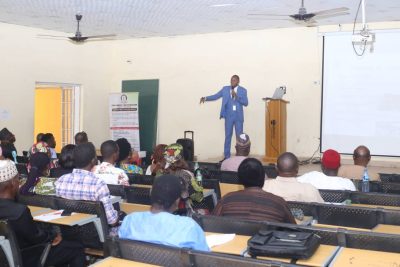
In December 2023, as part of a climate change advocacy programme, group co-lead Ovie Edegbene organised a lecture on the impact of climate change on the environment to selected high school students in Benue State, Nigeria. A brief report is available here.
In December 2023, group co-lead Hiba Baroud was a panelist at a session on “Young scientists for interdisciplinary research and climate innovation” at COP28.
The group organised a webinar on “Climate Change policy: a non-specialist toolkit” in early December 2023, as part of the COP28 activities. See here for details and outcomes.
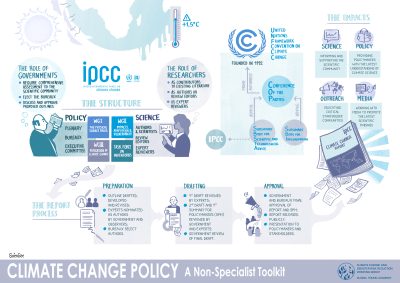
(illustration by Jacopo Sacquegno)
Members of the group contributed to producing a policy brief on “Toward a comprehensive approach to youth empowerment for climate action” for the T20 task force 2 (Climate change and environment). T20 is an engagement group that contributes to the G20 by providing research-based policy recommendations to the G20.
In October, the working group co-leads, Shabana Khan (India) and Khamarrul Razak (Malaysia) as well as member Chioma Daisy Onyige (Nigeria) participated in the 2019 Global Development Conference on the theme of “Knowledge for Sustainable Development: The Research Policy Nexus” in Bonn, Germany. See here for a short report.
The group launched a GYA Climate Change channel on YouTube in October 2019.
Group co-lead Shabana Khan (India) will participate in a session on ‘Water challenges for the 2030 Agenda in the face of climate change’ at the World Social Science Forum in Japan in September 2018.
Group member Jackie Dawson (Canada) is one of the lead authors for the upcoming 6th Assessment Report by the Intergovernmental Panel on Climate Change (IPCC).
The group currently works on a survey project on ‘Archiving Global Risk Perception, Communication and Response to Flooding’. Flooding is a leading attributed cause of deaths from natural disasters across the world. In 2018, by 20 September, more than 2,300 people have been killed and five million people were affected across 60 countries in over 130 flood events (http://watchers.news/category/floods/). There are a few global projects that have a repository of the global data for flood occurrences, resultant disasters and potential impact of climate change. However, there is a gap in global studies that brings varied perception, communications, and response together, particularly on the basis of primary data. The group members are aiming to bridge this gap through an initial flood assessment of three case study sites from India, Bangladesh and Malaysia, and subsequently extending it to other parts of the world. At these workshops, data will be collected about various issues relating to climate change and flooding. The workshop in India took place in August 2018.
Group members will participate in the ‘International Conference on Geomatic and Geospatial Technology‘ in September 2018 in Malaysia.
The group is currently developing a project in collaboration with the World Meteorological Organization’s Social and Economic Research Applications working group for the Year of Polar Prediction.
Previously, the Working Group worked with the U.S. National Academy of Sciences and the UN Foundation to ensure the representation of young scientists at regional international climate workshops.
They also collaborated on the development of a session that included emphasis on young scientists for an international climate-change conference. The Working Group has also been exploring options for hosting online conversations about timely and relevant climate challenges of interest to young scientists and citizens.
Panel “Transforming Society and Science for Sustainability – Addressing Challenges in Transdisciplinary Research”, “Our Common Future Under Climate Change” conference, 7-10 July 2015, Paris, France
The Working Group members co-developed the session, “Transforming Society and Science for Sustainability – Addressing Challenges in Transdisciplinary Research” for the “Our Common Future Under Climate Change” conference, held from 7-10 July 2015 in Paris, France: http://www.commonfuture-paris2015.org/. This four-day conference was the largest forum for the scientific community to come together ahead of the 21st UN Framework Convention on Climate Change (UNFCCC)’s Conference of the Parties (COP21), which will be hosted by France in December 2015.
Building on the results of Intergovernmental Panel on Climate Change’s 5th Assessment Report (AR5), the conference addressed key issues concerning climate science and societal responses. The entities organizing the conference included key collaborators of the GYA, such as ICSU, Future Earth, and UNESCO. Input to the session was led by Jauad El Kharraz and Laura Petes and informed by many working group members, including Manjur Karim, Jeremy Kerr, and Prateep Beed, among others. Jauad co-convened the session in Paris, and Julia Baum delivered remarks on the role of young scientists in advancing understanding and sustainable solutions associated with climate change.